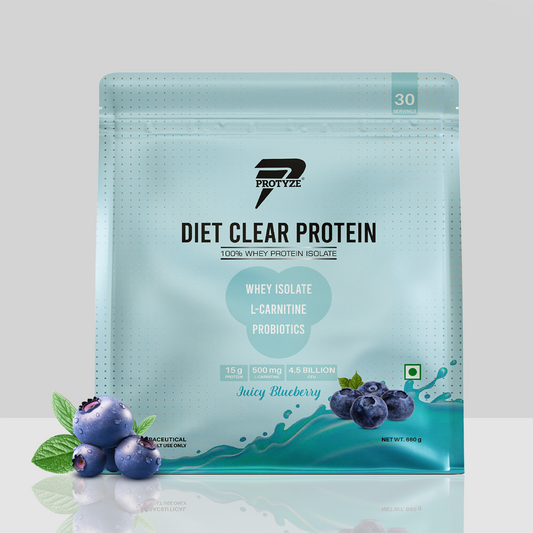Supplements like protein powders, multivitamins, and fish oils have become popular tools for supporting health, fitness, and wellness goals. They can help fill nutritional gaps, boost energy, and aid recovery—but more isn’t always better. Over-supplementing, or taking more than your body needs, can lead to health issues, wasted money, and even counterproductive effects on your goals.
This blog explores the signs of over-supplementation, the risks involved, how to assess your needs, and how to find balance with a healthy lifestyle. We’ll also highlight Protyze Diet Clear Whey Protein, a low-calorie, probiotic-enhanced supplement with flavors like Juicy Mango, to show how to use supplements wisely. Whether you’re a fitness enthusiast or simply looking to optimize your health, this article will help you navigate supplementation safely.
Why Over-Supplementing Is a Concern
Supplements are designed to complement a healthy diet, not replace it or overload your body with excess nutrients. While they can be beneficial when used correctly, taking too many—or too much of a single supplement—can lead to problems. Here’s why over-supplementing is a concern:
- Nutrient Imbalance: Excessive intake of one nutrient can interfere with the absorption or function of others, leading to imbalances that affect your health.
- Toxicity Risks: Some nutrients, especially fat-soluble vitamins and minerals, can accumulate in the body and cause toxicity if taken in high doses over time.
- Digestive Stress: Overloading your system with supplements like protein powders or fiber can strain your digestive system, causing discomfort.
- Wasted Money: If your body doesn’t need the extra nutrients, you’re essentially flushing money away, as excess is often excreted or unused.
- False Sense of Security: Relying too heavily on supplements can lead you to neglect a balanced diet, which provides a wider range of nutrients and benefits supplements can’t replicate.
Understanding the signs of over-supplementation can help you avoid these risks and ensure you’re using supplements in a way that truly supports your health.
Signs You’re Over Supplementing
Over supplementing can manifest in various ways, depending on the type and amount of supplements you’re taking. Here are the key signs to watch for:
1. Digestive Issues
Your digestive system can be the first to signal that you’re taking too many supplements, especially protein powders, fiber, or multivitamins.
Symptoms:
- Bloating, gas, or stomach cramps after taking supplements.
- Diarrhea from high doses of vitamin C, magnesium, or fiber supplements.
- Constipation from excessive calcium or iron.
Why It Happens:
Your body can only process so much at once. For example, taking more than 40g of protein in one sitting might overwhelm your digestive system, leading to discomfort. Similarly, high doses of certain vitamins can irritate your stomach lining.
What to Do:
Reduce your dose and spread intake throughout the day. For protein, aim for 20-30g per serving, like a scoop of Protyze Diet Clear Whey Protein, which provides 15g of protein in a light, easy-to-digest formula.
2. Unusual Fatigue or Energy Crashes
While supplements like B vitamins or caffeine pills are meant to boost energy, too much can have the opposite effect.
Symptoms:
- Feeling tired or sluggish despite taking energy-boosting supplements.
- Energy spikes followed by crashes, leaving you feeling drained.
- Difficulty sleeping, which leads to fatigue over time.
Why It Happens:
High doses of B vitamins can overstimulate your nervous system, causing a “crash” once the effect wears off. Similarly, excessive caffeine from pre-workouts or energy supplements can disrupt sleep, leading to chronic fatigue.
What to Do:
Stick to recommended doses and avoid taking energy supplements late in the day. Focus on natural energy sources like a balanced breakfast with protein and carbs.
3. Skin and Hair Changes
Your skin and hair can reflect an imbalance caused by over-supplementation, particularly with vitamins and minerals.
Symptoms:
- Acne or oily skin from high doses of B vitamins (especially B6 or B12).
- Dry, flaky skin or hair loss from excess vitamin A.
- Brittle nails or hair thinning from too much selenium or zinc.
Why It Happens:
Fat-soluble vitamins like A can accumulate in your body, leading to toxicity that affects your skin and hair. Overdoing certain minerals can also disrupt the balance of other nutrients, like copper, which is needed for healthy hair.
What to Do:
Check your supplement labels for vitamin A, B6, B12, or zinc, and ensure you’re not exceeding the recommended daily amounts. Focus on food sources for these nutrients instead.
4. Nausea, Dizziness, or Headaches
Taking too many supplements, especially on an empty stomach, can lead to physical symptoms that signal your body is overwhelmed.
Symptoms:
- Nausea or vomiting after taking multivitamins or fish oil.
- Dizziness or lightheadedness from high doses of magnesium or iron.
- Headaches from excessive vitamin D or caffeine supplements.
Why It Happens:
High doses of certain nutrients can irritate your stomach (e.g., iron) or affect your nervous system (e.g., magnesium). Excess vitamin D can raise calcium levels in your blood, leading to headaches or dizziness.
What to Do:
Take supplements with food to reduce stomach irritation, and lower your dose if symptoms persist. Consult a doctor if you suspect toxicity.
5. Changes in Urine or Bowel Movements
Your body often excretes excess water-soluble vitamins and minerals, which can show up in your urine or bowel movements.
Symptoms:
- Bright yellow or neon urine from high doses of B vitamins (especially B2, riboflavin).
- Dark stools or constipation from too much iron.
- Frequent urination from excess vitamin C or diuretics in some supplements.
Why It Happens:
Water-soluble vitamins like B and C are excreted in urine when taken in excess, changing its color. Iron can build up in your gut, causing dark stools or digestive issues.
What to Do:
Bright yellow urine from B vitamins is harmless but indicates you’re taking more than needed. Reduce your dose and focus on dietary sources like whole grains and leafy greens.
6. Nutrient Imbalances or Toxicity
Over-supplementing can lead to imbalances or toxicity, especially with fat-soluble vitamins and minerals that your body stores.
Symptoms:
- Joint pain or kidney issues from too much vitamin D, which can raise calcium levels.
- Blurred vision, nausea, or liver issues from excess vitamin A.
- Tingling or numbness from too much vitamin B6, which can cause nerve damage.
- Heart palpitations or muscle weakness from excessive magnesium or potassium.
Why It Happens:
Fat-soluble vitamins (A, D, E, K) and certain minerals accumulate in your body, and high doses over time can lead to toxicity. For example, more than 3,000mcg of vitamin A daily can cause toxicity, while over 100mcg of vitamin D can harm your kidneys.
What to Do:
Stick to the Recommended Dietary Allowance (RDA) for these nutrients, and avoid taking multiple supplements with overlapping ingredients (e.g., a multivitamin plus a separate vitamin D supplement).
7. Dependency or Neglecting Diet
A less obvious sign of over-supplementation is becoming overly reliant on supplements while neglecting a balanced diet.
Symptoms:
- Skipping meals because you think supplements “cover” your needs.
- Feeling anxious about missing a supplement dose, even for a day.
- Not seeing results despite taking multiple supplements, indicating your diet lacks variety.
Why It Happens:
Supplements can’t replicate the complex nutrients, fiber, and antioxidants in whole foods. Over-reliance can lead to deficiencies in nutrients not found in your supplements, like fiber or phytonutrients.
What to Do:
Prioritize whole foods—fruits, vegetables, lean proteins, and whole grains—and use supplements only to fill specific gaps, not as a replacement for meals.
Risks of Over-Supplementing
Overdoing supplements can lead to more than just discomfort—it can have serious health consequences. Here are the key risks:
- Toxicity: High doses of fat-soluble vitamins (A, D, E, K) or minerals (iron, zinc) can accumulate, causing organ damage, kidney stones, or neurological issues.
- Nutrient Interactions: Excess of one nutrient can block the absorption of others—e.g., too much zinc can reduce copper absorption, leading to anemia.
- Digestive Overload: Overloading your system with protein, fiber, or vitamins can cause bloating, diarrhea, or long-term gut issues.
- Medication Interactions: High doses of supplements like vitamin K can interfere with medications (e.g., blood thinners), while excessive fish oil can increase bleeding risk.
- Financial Waste: If your body doesn’t need the extra nutrients, you’re spending money on supplements that are excreted or unused.
These risks highlight the importance of using supplements thoughtfully and in moderation.
How to Assess If You’re Over-Supplementing
To determine if you’re taking too many supplements, evaluate your needs, diet, and symptoms. Here’s how:
- Review Your Supplements: List all the supplements you take, including their ingredients and doses. Check for overlap—e.g., if your multivitamin and protein powder both contain high amounts of B vitamins, you might be doubling up unnecessarily.
- Assess Your Diet: Track your food intake for a few days to see if you’re already getting enough nutrients from whole foods. For example, if you eat fatty fish, fortified dairy, and leafy greens regularly, you might not need extra vitamin D or calcium supplements.
- Check Your Symptoms: Look for the signs mentioned above, like digestive issues, fatigue, or skin changes, which can indicate you’re overdoing it.
- Get Tested: A blood test can reveal if you’re deficient or overloaded in certain nutrients, like vitamin D, B12, or iron. This can help you adjust your supplement intake accordingly.
- Consult a Professional: A dietitian or doctor can help you determine your specific needs based on your age, gender, activity level, and health conditions.
By taking these steps, you can ensure you’re using supplements in a way that supports your health without going overboard.
Conclusion
Over-supplementing can do more harm than good, leading to digestive issues, fatigue, skin changes, toxicity, and nutrient imbalances. By recognizing the signs—like bloating, nausea, or unusual fatigue—you can adjust your intake and avoid the risks of going overboard. Focus on a nutrient-dense diet, use supplements sparingly to fill specific gaps, and support your body with exercise, hydration, sleep, and stress management. Protyze Diet Clear Whey Protein, with its 15g protein, low-calorie, probiotic-enhanced, 99% lactose-free formula, is a balanced choice to support your needs in flavors like Juicy Mango and Juicy Blueberry, without overloading your system. Assess your needs, consult a professional if necessary, and find the right balance to ensure supplementation enhances your health.





